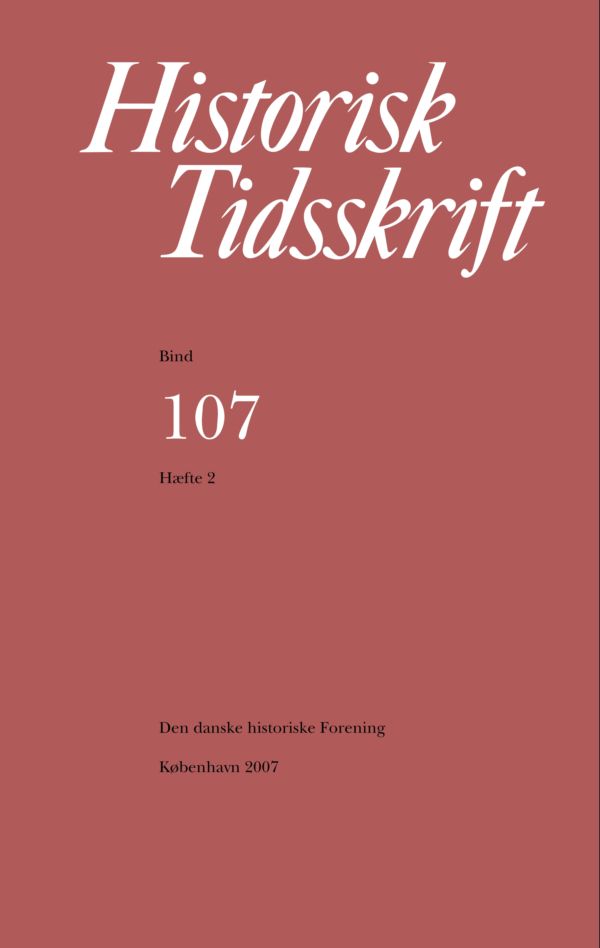'Embedsmandsbakterien' i socialpolitikken. En studie i arbejderforsikringsrådets forvaltning 1898-1916
Resumé
The ‘Public Servant Germ’ in Social Policy: A Study of the Workers’ Insurance Board 1898-1916The Workers’ Accident Insurance Law of 1898 was one of three important elements in the new Danish social legislation of the 1890s. The scholarly debates on the historical development of Danish social policy have generally focused on political conflicts and the enactment of legislation ensuing from such conflicts. This study analyses the relationship between on the one hand the policy articulated in the law and on the other hand its actual implementation by public servants. The insurance scheme was to be run by private insurance companies, but the overall administration and supervision fell into the hands of a corporate body, the Workers’ Insurance Board, which became, in reality, the highest authority in these matters. Three members (including the chairman and a doctor) were commissioned to look after the common good whereas four members, two from either side, represented business and labour. This institutional set-up had been chosen in order to ensure that administration took place according to the letter and was considered fair and rightful by the opposing sides. The industrial accident insurance system entitled workers to compensation for random accidents due to the inherent dangers of the workplace environment. However, this social right was limited in regard to accidents caused by intention or negligence. Occasionally, this resulted in fierce disputes over workers’ responsibility. According to the law the Workers’ Insurance Board should – by the character of its decisions – encourage discipline and sensibility among workers, holding them accountable for their own actions. Several employers and insurance companies argued that the Workers’ Insurance Board disregarded this political aim. A close study of the appeal cases indicates that such complaints were not solely due to economic motivations in each case. As it turned out, the administration exercised a rather unexpected and independent interpretation of the article on workers’ negligence; indeed, they turned the whole issue around. The article was disregarded in order to make employers assume responsibility, by insuring their workers with a proper insurance company and by enhancing local safety measures. In other words, if nearly all workers stricken by an accident received compensation, employers would take action, knowing that pleading negligence on the part of the worker was no way of escaping the compensation claim. Consistent as it may have been, this interpretation was clearly not a part of the intended policy. The discrepancy is explained by the way the administration worked. The Workers’ Insurance Board was assisted by public servants who undertook the day-to-day examination of an increasing amount of accident reports. The corporate board met only once a week to make the formal decision in accordance with what the public servants had already determined. Interpretative power was transferred into their hands, permitting them to enforce their own values by way of the large number of discretionary decisions. Experts on social subjects had held no power in the law-making process, but eventually gained considerable bureaucratic power – one of technocratic knowledge rather than social representation. Another explanation of the said discrepancy was a tacit compromise between bureaucrats and board members. Due to the corporate structure the latter enjoyed wide recognition among the actors on the labour market. Had the real strength of bureaucratic power been more obvious, unfavourable decisions would probably have given rise to dissatisfaction, not least among workers who by tradition were suspicious of public servants. The power of the bureaucrats was thus sheltered by the need for public acceptance. Generally, bureaucrats as well as board members derived an advantage from the smooth working of the system. As administrative appeal authority the Ministry of the Interior exercised very little control and showed itself surprisingly unable to establish future precedent by overruling decisions made by the Workers’ Insurance Board. The problems never really surfaced on the political level, indicating differences of perception and logic between the two spheres of action. This study is on whether actual practice was in accordance with politically pre-defined targets. But perhaps more than anything else it highlights a new and more creative bureaucratic figure – the welfare state administrator.Downloads
Publiceret
Citation/Eksport
Nummer
Sektion
Licens
Ophavsret til bidrag i Historisk Tidsskrift tilhører forfatterne og Den danske historiske Forening som udgiver af Historisk Tidsskrift. For illustrationer gælder den ophavsret, som står anført i billedteksten. Ophavsretslovens almindelige bestemmelser gælder, hvilket vil sige, at ophavsretten gælder i 70 år efter forfatterens død. Bidrag i Historisk Tidsskrift må derfor, med forbehold for en ”moving wall” på tre år, frit downloades, læses, gemmes, anvendes og citeres (med kildeangivelse) i privat og videnskabelig sammenhæng, men de må ikke helt eller delvis genudgives af tredjepart, heller ikke i redigeret form, uden tilladelse fra forfatterne og Den danske historiske Forening. Henvendelse skal i så fald rettes til Historisk Tidsskrifts redaktion på histtid@hum.ku.dk.





